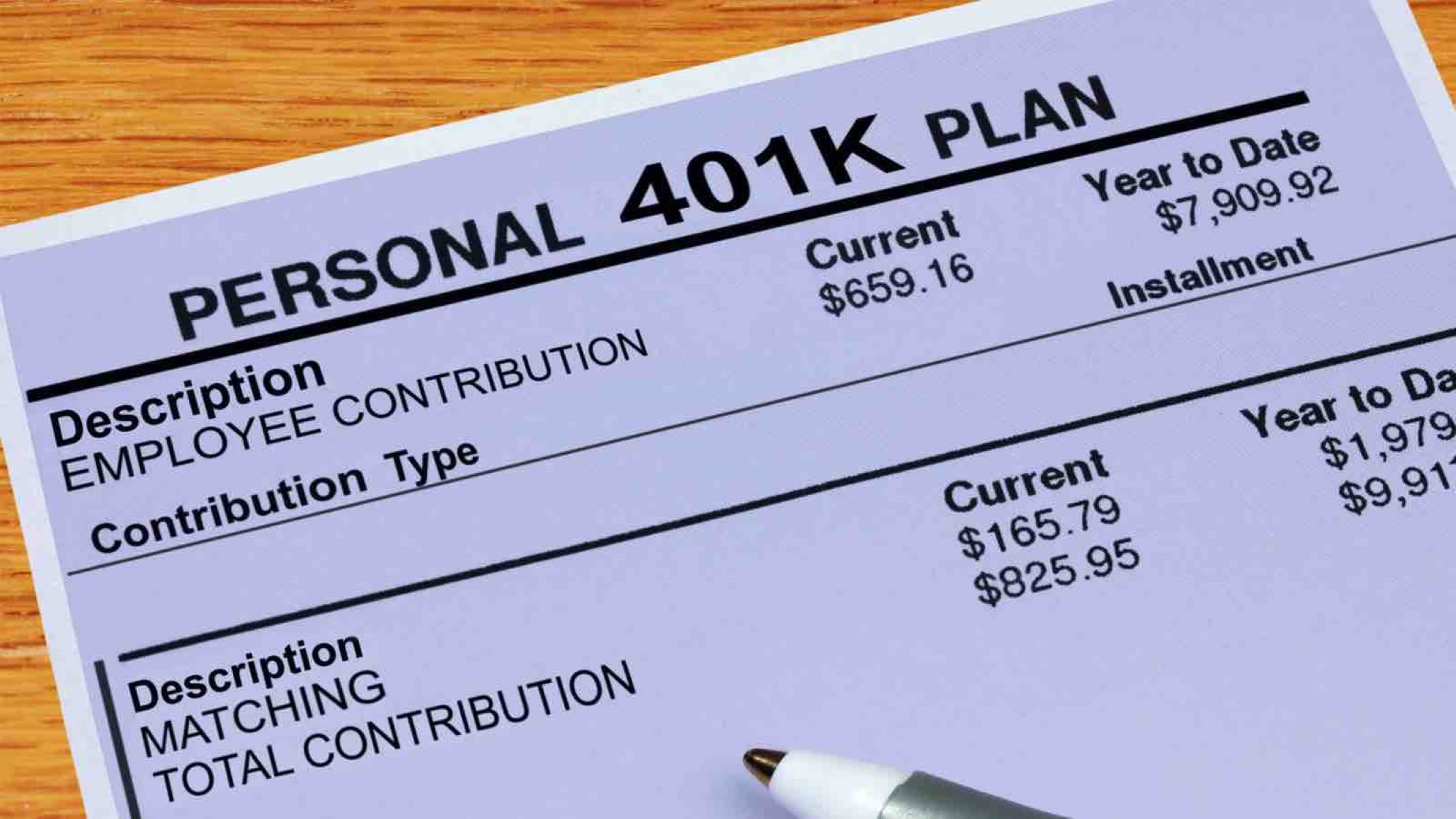Home>Finance>How Long Does An Employer Have To Deposit 401K Contributions


Finance
How Long Does An Employer Have To Deposit 401K Contributions
Modified: December 30, 2023
Learn the time limit for employers to deposit 401K contributions in this informative finance guide. Find out when you can expect your retirement savings to be deposited.
(Many of the links in this article redirect to a specific reviewed product. Your purchase of these products through affiliate links helps to generate commission for LiveWell, at no extra cost. Learn more)
Table of Contents
Introduction
401K contributions are an essential part of retirement planning for employees. This retirement savings plan allows employees to contribute a portion of their wages to a tax-advantaged account, which can be invested in various securities such as stocks, bonds, and mutual funds. One of the key factors that determines the success of a 401K plan is the timely deposit of contributions by the employer.
In this article, we will delve into the timeline and legal requirements that employers must adhere to when depositing employee’s 401K contributions. We will also discuss the consequences of late deposits and the remedies available to rectify the situation.
Understanding the intricate details of 401K contributions is crucial for both employers and employees. Employers need to ensure compliance with legal regulations, while employees rely on timely and accurate deposits to secure their retirement savings. Let’s explore the employer’s responsibility and the time frame for depositing 401K contributions.
Understanding 401K Contributions
Before we dive into the specifics of depositing 401K contributions, it’s important to have a clear understanding of what these contributions entail. A 401K is a type of defined-contribution retirement plan, where employees can voluntarily contribute a percentage of their pre-tax income to save for retirement. These contributions are typically deducted from the employee’s paycheck and deposited into a designated 401K account.
There are several advantages to participating in a 401K plan. Firstly, the contributions made by employees are tax-deductible, meaning they can lower their taxable income. Secondly, the funds within the 401K account can grow tax-free until they are withdrawn during retirement. Additionally, many employers offer matching contributions, where they contribute a percentage of the employee’s salary to their 401K plan, effectively doubling their savings.
401K contributions can be made in two ways: traditional and Roth. Traditional contributions are made with pre-tax dollars, meaning the contributions are deducted from the employee’s income before taxes are calculated. This offers an immediate tax benefit as the taxable income is reduced. On the other hand, Roth contributions are made with after-tax dollars. While Roth contributions do not provide immediate tax savings, the withdrawals during retirement are tax-free.
It’s important for employees to regularly review and adjust their 401K contributions based on their financial goals and investment strategy. Contribution percentages can be modified, and many employers offer tools and resources to help employees make informed decisions about their retirement savings.
Now that we have a clear understanding of what 401K contributions are, let’s explore the employer’s responsibility in handling these contributions.
Employer’s Responsibility
Employers play a vital role in the administration and management of 401K contributions. When it comes to handling employee contributions, employers have several key responsibilities:
- Enrollment: Employers are responsible for providing employees with the necessary information and resources to enroll in the 401K plan. This includes educating employees about the benefits of the plan, explaining contribution options, and assisting with the enrollment process.
- Collection: Employers must collect employee contributions and ensure that they are deducted from the employee’s paycheck as specified. This requires accurate record-keeping and coordination with the payroll department to ensure that contributions are properly allocated to each employee’s 401K account.
- Deposit: Perhaps the most crucial aspect of the employer’s responsibility is the timely deposit of employee 401K contributions. Employers are legally obligated to deposit these contributions into the employees’ designated 401K accounts as soon as administratively feasible. This ensures that the funds are available for investment and begin accruing returns for the employee’s retirement savings.
- Monitoring: Employers are also responsible for monitoring the performance of the 401K plan and ensuring that it remains compliant with applicable laws and regulations. This includes reviewing investment options, evaluating plan fees, and communicating any changes or updates to employees.
Meeting these responsibilities is not only crucial for legal compliance but also for fostering trust and confidence among employees. Employees rely on their employers to handle their retirement contributions with diligence and care.
Next, let’s explore the specific time frame within which employers are required to deposit 401K contributions.
Time Frame for 401K Contributions
Employers are legally required to deposit employee 401K contributions within a specific time frame. The Department of Labor (DOL) has established guidelines known as the “timely deposit rule” to ensure the prompt and accurate deposit of these contributions.
Under the timely deposit rule, employers must deposit employee 401K contributions as soon as administratively feasible. While the rule does not specify an exact timeframe, it is generally understood that deposits should be made as soon as possible, ideally within the next pay period or within a few days after the contributions are withheld from the employee’s paycheck.
It is important to note that the timeframe for depositing 401K contributions may vary depending on the size and structure of the employer’s organization. Larger companies may have more complex payroll systems and processes, which might require a slightly longer time frame for depositing contributions. However, regardless of the size of the company, the primary guiding principle remains the same – contributions should be deposited as soon as administratively feasible.
The DOL also recommends that employers implement internal procedures and controls to ensure the prompt and accurate deposit of 401K contributions. This includes establishing clear communication channels between payroll departments, plan administrators, and the financial institutions responsible for managing the 401K accounts.
By adhering to the prescribed timeframe for depositing 401K contributions, employers demonstrate their commitment to the financial well-being of their employees and their compliance with legal obligations.
Now that we understand the time frame for depositing 401K contributions, let’s delve into the legal requirements set forth by governing authorities.
Legal Requirements
When it comes to handling employee 401K contributions, employers must comply with several legal requirements established by governing authorities. Failure to meet these requirements can result in penalties, fines, and potential legal action. Here are some of the key legal requirements related to 401K contributions:
- ERISA: The Employee Retirement Income Security Act (ERISA) sets the foundation for the regulation of employee benefit plans, including 401K plans. ERISA establishes fiduciary standards that employers must adhere to when handling employee contributions. This includes acting in the best interest of the plan participants, prudently managing plan assets, and accurately reporting plan information.
- DOL Guidelines: The Department of Labor (DOL) has issued guidelines concerning the handling of 401K contributions. Employers must comply with the DOL’s requirements for timely depositing of contributions into employee accounts. Failure to deposit contributions within the required timeframe may result in penalties and potential legal consequences.
- Plan Document: Employers must have a written plan document that outlines the terms and conditions of the 401K plan. This document should clearly state the contribution requirements, the timing of deposits, and the responsibilities of both the employer and the employee.
- Annual Reporting: Employers are obligated to file certain reports with regulatory authorities, such as the Internal Revenue Service (IRS) and the DOL. These reports provide information about the 401K plan, including the details of employee contributions, plan expenses, and investment performance.
It is crucial for employers to stay up to date with any changes or updates to the legal requirements surrounding 401K contributions. This may involve consulting legal professionals or benefit plan administrators who specialize in retirement plan compliance.
Employers who fully understand and comply with these legal requirements can ensure the smooth operation of their 401K plans and instill confidence in their employees that their contributions are being handled in accordance with the law.
Next, let’s explore the consequences of late 401K contributions and how employers can remedy the situation.
Late Contribution Consequences
When employers fail to deposit employee 401K contributions within the required timeframe, there can be serious consequences. Late contributions can have negative implications for both employees and employers. Let’s examine the potential consequences:
- Penalties and Fines: The Department of Labor (DOL) has the authority to impose penalties and fines on employers who consistently fail to comply with the timely deposit rule. These penalties can vary depending on the severity and duration of the late contributions. The DOL can also require employers to restore any financial losses or missed earnings resulting from the late deposits.
- Lost Investment Opportunity: When employee contributions are not deposited on time, it means that the funds are not available for investment. This can result in lost potential earnings for employees. Over time, missed investment opportunities can significantly impact the growth of an employee’s retirement savings.
- Loss of Employee Trust: Late contributions can erode employee trust and confidence in their employer’s ability to handle their retirement funds responsibly. Employees may question the financial stability and reliability of the company, which can negatively impact morale and employee satisfaction.
- Legal Consequences: In severe cases, employees may take legal action against their employer for the mishandling of 401K contributions. This can lead to costly legal battles, damage to the company’s reputation, and potential financial liabilities.
It’s crucial for employers to take prompt action to rectify any late contribution issues and ensure that they are promptly depositing employee 401K contributions to avoid these negative consequences.
Now that we understand the potential consequences of late contributions, let’s explore the available remedies for employers to address the situation and minimize the impact on employees.
Remedies for Late Contributions
When employers discover that they have made late 401K contributions, it is important to take immediate action to rectify the situation. Employers have several remedies available to address late contributions and mitigate the impact on employees:
- Corrective Deposits: The first step is to make the necessary corrective deposits to ensure that the employee contributions are properly deposited into their 401K accounts. Employers should allocate the funds and update the employee’s account balance accordingly. It’s crucial to make these deposits as soon as possible to minimize the impact on the employees’ retirement savings.
- Communication and Transparency: Employers should communicate openly and transparently with employees about the late contribution issue. Inform employees about the situation, the steps being taken to rectify it, and any potential impact on their retirement savings. Clear and honest communication helps regain employee trust and confidence in the employer’s commitment to their financial well-being.
- Reimbursement of Losses: In cases where employees have suffered financial losses or missed investment opportunities due to late contributions, employers may need to reimburse them for those losses. This may include compensating for any missed earnings or additional taxes incurred as a result of the late contributions.
- Implement Process Improvements: Employers should review their internal processes and controls to identify any gaps or issues that contributed to the late contribution problem. Implementing process improvements can help prevent similar issues in the future and ensure timely and accurate deposit of 401K contributions.
It is essential for employers to work closely with their plan administrators, payroll departments, and financial institutions to promptly resolve any late contribution issues. Seeking guidance from legal and compliance professionals can also help ensure that the appropriate steps are taken to rectify the situation and prevent future occurrences.
By proactively addressing late contribution issues and implementing necessary remedies, employers can demonstrate their commitment to the retirement savings of their employees and maintain a strong and trusted employer-employee relationship.
Now that we have explored the remedies for late contributions, let’s summarize the key points of this article.
Conclusion
401K contributions are a critical aspect of retirement planning for employees, and the timely deposit of these contributions by employers is crucial for the success of the plans. Understanding the responsibilities and legal requirements associated with 401K contributions is essential for employers to ensure compliance and maintain employee trust.
Employers must enroll employees, collect contributions, and deposit them into designated 401K accounts as soon as administratively feasible. Adhering to the timely deposit rule set by the Department of Labor demonstrates the employer’s commitment to fulfilling their fiduciary duties and safeguarding the retirement savings of their employees.
Late contributions can lead to penalties, fines, lost investment opportunities, and a loss of employee trust. It is important for employers to take immediate action to rectify any late contribution issues, communicate transparently with employees, and reimburse any financial losses incurred as a result of the delay.
Implementing process improvements and working closely with plan administrators, payroll departments, and financial institutions can help employers prevent future instances of late contributions and ensure the smooth operation of their 401K plans.
In summary, employers must prioritize the timely deposit of employee 401K contributions to uphold their legal obligations, fulfill their fiduciary duty, and maintain employee confidence in the company’s commitment to their financial well-being. By doing so, employers can play a vital role in helping employees secure a prosperous retirement.














